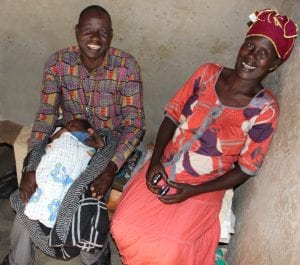In a country where work is hard to find, many men in Uganda find themselves traveling great distances from their families searching for sustainable incomes. Seventy-two percent of men in Uganda and 64% of women report feeling that men spend too little time with their children due to their work. Additionally, when men can stay close to home, they take on the role of decision-makers yet contribute little with childcare. Although evidence shows the benefits of men’s participation in childcare and domestic work, nearly half of the Ugandan population still believes that men shouldn’t be involved in caregiving or general housework. To date, women and girls still unequally bear the burden of caring for children and other household members.
In order to address these inequities in conjunction with general program implementation, Village Enterprise participants are encouraged to bring their partners or spouses to the nine-module business training. Encouraging men to support their partners’ businesses improves household power dynamics while equalizing economic and care responsibilities in the family setting.
To understand the impact our program can have when male spouses are involved, we interviewed Michael Erimu. Michael is not a Village Enterprise entrepreneur. He is, however, married to Grace Atim, a Village Enterprise retail clothing entrepreneur. The couple has seven children, and one of them is battling a life-threatening disease that weighs heavily on the family’s financial and emotional well-being.
Michael is a shining example of how the intentional presence of a father and spouse can change lives. And with that, we wish all fathers globally a very happy fathers day!
Michael tells his story below:
 Before my wife, Grace, joined Village Enterprise, I worked as a secondary school teacher. My job allowed me to support my family financially but required that I spend most of my time away from home. So while Grace cared for our children and watched over our home, I sent everything I had back to support them. However, everything changed when two of our children were diagnosed with life-threatening diseases. Although there are treatments available to manage the symptoms, they are either temporary, expensive, or both.
Before my wife, Grace, joined Village Enterprise, I worked as a secondary school teacher. My job allowed me to support my family financially but required that I spend most of my time away from home. So while Grace cared for our children and watched over our home, I sent everything I had back to support them. However, everything changed when two of our children were diagnosed with life-threatening diseases. Although there are treatments available to manage the symptoms, they are either temporary, expensive, or both.
Caring for a loved one suffering from a chronic disease can take its toll on a family, and after a while, Grace could no longer care for our children alone. Most employers are empathetic, but because helping her meant that I often missed work, I eventually quit the teaching profession. Although we now had the time to care for our children, we were struggling to provide basic necessities for them in addition to the medical treatments required for our son. Furthermore, without stable jobs, we did not have access to growth capital, nor did we have a safe place to save money and borrow from in times of medical emergencies. Things were hard for my family for a long time, but in 2020, with Grace pregnant again, a Village Enterprise business mentor visited my wife and me, and everything changed.
The business mentor told us about the Village Enterprise poverty graduation program, which supports three entrepreneurs with different but complementary skills to form one business. He thought that Grace would be a perfect candidate for the program and that Village Enterprise would provide the seed capital to start her business after she completed training sessions. The business mentor assured us that consistent mentorship is part of the program. He also shared that the entrepreneurs would form business savings groups consisting of 30 entrepreneurs (10 business groups) per group.
I wanted to learn how best to support my wife throughout this program, so I decided to attend all nine training modules with her. Through the training sessions, Grace learned how to turn her skill as a retail clothing hawker into a structured and profitable business.
After business training concluded in March, Grace started her new business – a retail thrift clothing store. She needed to transport heavy sacks of clothes from the wholesalers’ location to our compound, where she set up the selling space. She was heavily pregnant, so I took charge of lifting heavy sacks. We got into a daily routine, and before Grace would leave for the market, we would sit together as a family to plan her movements. We would decide how much to spend and how to split our parenting roles. I help her keep business records and sometimes make sales for her, and we have grown much closer. I represent her whenever she cannot attend business savings group meetings—just as her business mentor advised—and together, we decide how much to set aside for savings each week.
Before Grace joined the Village Enterprise program, we were gambling and living month to month, hoping to generate enough money to support our children. Still, today, we think in terms of profits, expenditure, and future investment. So we save diligently and set money aside for emergency funds.
I watched with pride as my wife bought two pigs, three goats, new plates, and new mattresses with profits from her business. These changes have been gradual yet incredibly fulfilling for our home life. I am grateful that I no longer have to travel far to support our children financially and can be fully present in their lives. Grace’s Village Enterprise business, which started as profit generation for her and her two friends, has evolved into a family business. My wife is the most hardworking woman I know, and I am so happy to support her.